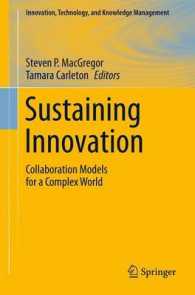- ホーム
- > 洋書
- > 英文書
- > Politics / International Relations
Full Description
Is the United States ceding its economic power to China? In this compelling book, Gordon C.K. Cheung uses theoretical exploration as well as empirical studies to scrutinize this key question and China's complex relations with the global economy. Employing innovative concepts, the author demonstrates that China's economic identity is now heavily influenced by the growth in its entrepreneurial spirit.
Critically questioning the ebbing authority of the US in the East Asian region, Cheung identifies how China's exercise of soft power not only appeals to East Asian historical tradition, but also has begun to translate into tangible economic benefits. The author evaluates China's future economic competitiveness in the global economy and how its performance will be tested in areas of national interest: the protection of intellectual property rights, financial integration and the role of China's sovereign wealth funds. China's two grand ambitions, the Belt and Road Initiative and the Asian Infrastructure Investment Bank - both of enormous significance to the future of global economic development - are also discussed.
With strong empirical evidence and a fresh perspective on China's development, this book will be of great interest to postgraduate students of economics, international relations, business and globalization, as well as scholars and policy makers interested in China's international influence.
Contents
Contents: Preface PART 1 INTRODUCTION 1. China's economic transformation in a changing world PART II PERSPECTIVES AND DEVELOPMENT 2. From hegemonic decline to regional interdependence: shifting economic paradigm 3. From peaceful rise to soft power: the manufacturing of attractiveness 4. From developmental to entrepreneurial: varieties of political economy PART III NEW GLOBAL ECONOMIC FOOTPRINTS 5. Innovation protection and the significance of intellectual property rights 6. Crisis resolution and the global financial competition 7. Global inequality, sovereign wealth funds and China's 'go out' enterprises PART IV CONCLUSION 8. Globalization, resistance and assimilation References Index








